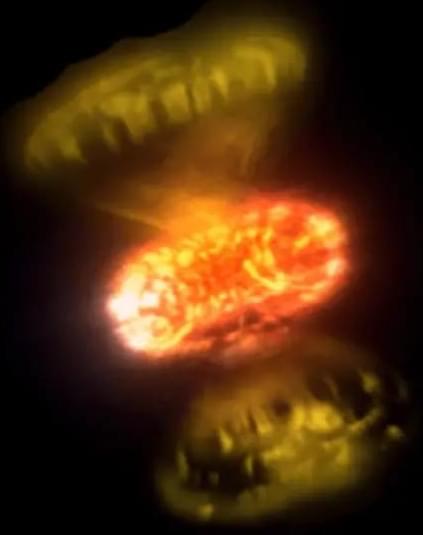Bobrick, Alexey, Martire, Gianni




The Bcl6-Blimp-1 axis plays a critical role in follicular T helper (Tfh) cell fate determination; however, the regulation of CXCR5 expression during Tfh maturation is still elusive. Zhu et al. report that the Bhlhe40-Pou2af1 pair regulates optimal expression of CXCR5 and Tfh cell migration into germinal centers without affecting Bcl6 induction.

Dopamine neurons in a part of the brain called the midbrain may, with aging, be increasingly susceptible to a vicious spiral of decline driven by fuel shortages, according to a study led by Weill Cornell Medicine investigators. The findings offer a potential explanation for the degeneration of this neuron population in Parkinson’s disease.
In the study, published Dec. 5 in the Proceedings of the National Academy of Sciences, the scientists examined how midbrain dopamine neurons, which have unusually numerous output branches, handle their high energy requirements. They showed that these neurons under normal conditions create a fuel reserve in the form of clusters of glucose molecules called glycogen. This allows the neurons to keep working for a surprisingly long time even when their usual supply of glucose from the blood is interrupted. However, the researchers also discovered that the neurons regulate their glycogen storage in a way that can leave them highly vulnerable to glucose shortages, especially as their functions begin to decline with aging.
“This vulnerability may explain the deaths of these midbrain neurons in Parkinson’s and is consistent with the idea that energy insufficiency is a common failure mode in neurological disorders,” said study senior author Timothy Ryan, the Tri-Institutional Professor of Biochemistry and Biophysics and a professor of biochemistry in anesthesiology at Weill Cornell Medicine.

“Novae are more than fireworks in our galaxy — they are laboratories for extreme physics,” said Dr. Laura Chomiuk.
What can imaging supernovae (plural for supernova) explosions teach astronomers about their behavior and physical characteristics? This is what a recent study published in Nature Astronomy hopes to address as an international team of researchers investigated the mechanisms behind the thermonuclear eruptions that supernovae cause. This study has the potential to help scientists better understand supernovae, as they are hypothesized to be responsible for spreading the chemical elements and molecules needed for life throughout the universe.
For the study, the researchers used the Georgia State University CHARA Array to observe exploding supernovae from two separate white dwarfs: nova V1674 Her and nova V1405 Cas, which are located approximately 16,200 and 5,500 light-years from Earth, and were observed days 2 & 3 and days 53, 55, & 67 after first light of eruption, also known as t0, respectively. For nova V1674 Her, the researchers observed outflows during days 2 & 3, while they observed this same behavior for nova V1405 Cas during days 53, 55, & 67. The researchers note these contrasting observations challenge longstanding hypotheses regarding supernovae behavior during their eruption periods.
I personally don’t believe that our universe will end because the universe has access to the quantum realm which can rebirth particles into existence but I still think the universe can be saved from entropy by mastering universe control with kardeshev type 5 civilization technology or type infinity civilization technology. Think even stars can become immortal essentially if we can recharge them which I believe that universes can become immortal essentially aswell but would require massive amounts of energy and control of their particles with a possible holographic magnonics essentially patching areas or rebirthing areas.
Brooklyn is not expanding.
My beautiful Gina.
Four space travellers encounter a sinister force on Mars that threatens to stifle all life forms within its reach.
The Wizard of Mars (1965) aka Horrors Of The Planet.
Starring: L. Frank Baum, Armando Busick, David L. Hewitt.
Director: David L. Hewitt.
Go to https://ground.news/sabine to get 40% off the Vantage plan and see through sensationalized reporting. Stay fully informed on events around the world with Ground News.
In quantum physics, a wave function is a mathematical way to describe everything in the universe. But since quantum physics emerged, physicists have argued about whether or not the wave function is real. A group of physicists recently conducted a test of a theorem that describes the mechanics of the wave function, and they’ve told the press that they’ve settled the question: Yes, the wave-function is real. Let’s take a look.
Paper: https://arxiv.org/abs/2510.
👕T-shirts, mugs, posters and more: ➜ https://sabines-store.dashery.com/
💌 Support me on Donorbox ➜ https://donorbox.org/swtg.
👉 Transcript with links to references on Patreon ➜ / sabine.
📝 Transcripts and written news on Substack ➜ https://sciencewtg.substack.com/
📩 Free weekly science newsletter ➜ https://sabinehossenfelder.com/newsle… Audio only podcast ➜ https://open.spotify.com/show/0MkNfXl… 🔗 Join this channel to get access to perks ➜ / @sabinehossenfelder 📚 Buy my book ➜ https://amzn.to/3HSAWJW #science #sciencenews #quantum #physics.
👂 Audio only podcast ➜ https://open.spotify.com/show/0MkNfXl…
🔗 Join this channel to get access to perks ➜
/ @sabinehossenfelder.
📚 Buy my book ➜ https://amzn.to/3HSAWJW
#science #sciencenews #quantum #physics


A University of Southampton study has revealed an intriguing new clue in the mystery of what triggers periods of very intense, brightly colored activity during displays of both the southern and northern lights.
Known as a “magnetospheric substorm,” this awe-inspiring phenomenon, which blankets the night sky in green and purple, is almost always preceded by what space scientists call “auroral beads”—a necklace-like wave of multiple luminous points of light which eventually evolve into the storm.
Southampton scientists have now shown there is a link between these auroral beads and the intensity of low frequency radio waves above the aurora in Earth’s magnetosphere—a vast area around our planet that is dominated by its magnetic field. Their findings are published in Nature Communications.